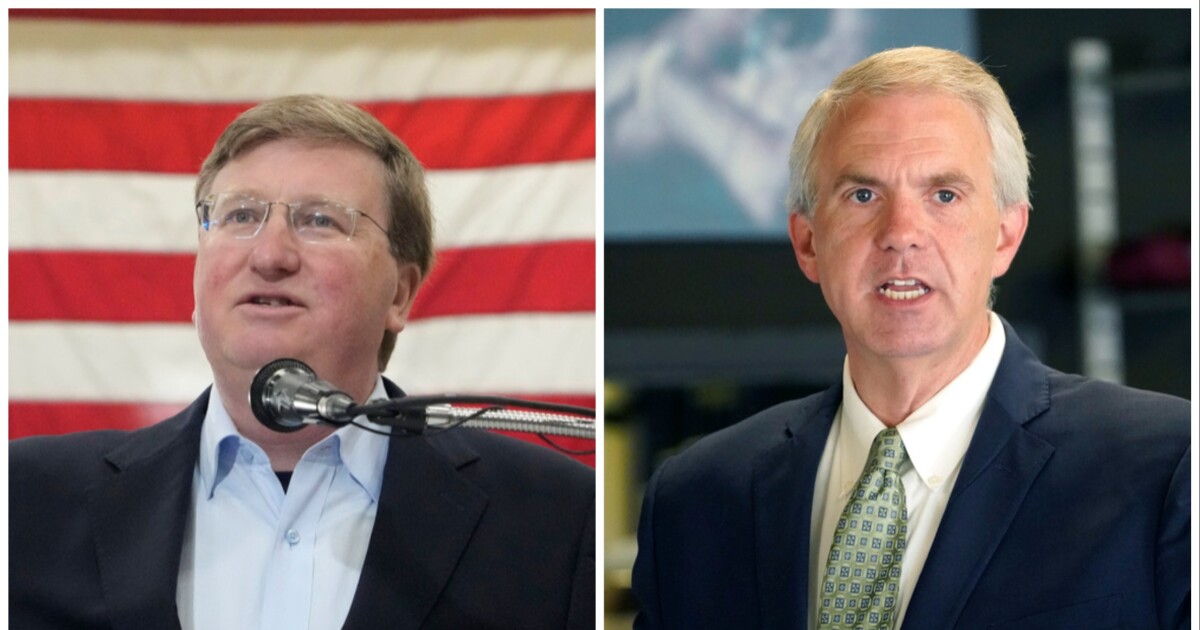

The 2023 elections may not have the fireworks of 2024, but there is still plenty up for grabs. In this “off-year,” most of which takes place on Nov. 7, Virginia will be keenly watched, particularly by followers of Gov. Glenn Youngkin, and whether he can springboard Republican success into national aspirations. Meanwhile, the governor’s mansion is up for grabs in Kentucky and Mississippi. New Jersey’s Republicans believe they have a real shot at turning the state red in legislative elections, while there are also fierce mayoral and district attorney battles throughout the United States. Voters will also decide several fascinating referendums, particularly in Ohio, Maine, and Texas.
This Washington Examiner series, November to Remember, will dive into all of these and more over the following two weeks. Part 13 will deal with Mississippi’s gubernatorial election.
Although Republicans hold all statewide seats in Mississippi, Democratic Public Service Commissioner Brandon Presley is hoping to defeat Gov. Tate Reeves (R-MS) in his reelection bid. But he faces a serious uphill climb.
Presley, a second cousin to rock ‘n’ roll legend Elvis Presley, seeks to become the first Democratic governor in the Magnolia State since Gov. Ronnie Musgrove left office in 2004. As an incumbent, Reeves is the likely favorite to win his reelection bid despite some complications.
NOVEMBER TO REMEMBER: DISTRICT ATTORNEY RACES FOCUS ON SPIKE IN CRIME AND PRISON VERSUS REFORM
Reeves, first elected in 2019, is one of the least popular governors in the nation, according to a July Morning Consult survey. He has been plagued by a multimillion-dollar welfare scandal in which $77 million in federal funds for the state’s low-income residents was instead directed to wealthy Mississippians.
Presley has campaigned and released ads slamming Reeves for the scandal, but the governor hit back with his own ad claiming that “he had nothing to do with the scandal. Nothing.”
Tate Reeves:
1. Involved in the largest public corruption scandal in state history
2. Ignored our hospital crisis until his election year – 47 days before Election Day
3. Spent millions of taxpayer dollars on renovationsIt’s time to send Tate Reeves packing this November.
— Brandon Presley (@BrandonPresley) October 17, 2023
Presley has also highlighted expanding Medicaid, to which Reeves is opposed, if elected governor. Mississippi is one of the top 10 poorest states in the nation, with a 19.4% poverty rate. An October Mississippi Today-Siena College poll showed 72% of voters favored Medicaid expansion with 23% opposed.
John Couvillon, a Louisiana-based pollster and consultant, said he likely sees Reeves eking out a win similar to his 2019 race against Democratic state Attorney General Jim Hood in which Reeves won 52.1% of the vote over Hood’s 46.6%.
“I see the percentages being similar to the Reeves hood race four years ago because you have two countervailing things going on,” Couvillon told the Washington Examiner. “The first is Reeves is no longer a challenger. He’s the incumbent and so that’s worth something, and that I think will offset any loss of popularity that Reeves may have from unfavorable publicity about the welfare scandal.” But Couvillon also said Reeves will likely underperform relative to the other Republicans on the statewide ticket.
During the one and only debate between the two candidates on Wednesday, Reeves sought to tie Presley to national Democrats, including President Joe Biden, who faces his own high disapproval numbers. “My opponent has outsourced his entire campaign to the Democrat National Committee,” Reeves said. “Joe Biden and his buddies have funded his campaign to the tune of 80% of the money that he has raised has come from California, New York, Massachusetts, and Washington, D.C. It ain’t charity.”
“They know if he is elected he’s gone govern like Joe Biden has governed America,” Reeves continued.
Although Presley has outraised Reeves by more than $5 million throughout the race, the governor has had more in cash on hand in the final days of the contest. Reeves has $3 million in cash remaining compared to Presley’s $1.2 million cash on hand, although $2 million of Reeves’s cash on hand falls under separate campaign laws. The Democratic Governors Association has poured nearly $4 million into Presley’s campaign.
A recent Democratic Governors Association poll showed Reeves beating Presley by only a percentage point, 46% to 45%, according to Mississippi Today. The poll theoretically put both candidates under the 50% threshold necessary to prevent a Nov, 28 runoff election. A previous poll from Magnolia Tribune-Mason-Dixon showed Reeves leading Presley 51% to 43%, an 8-point advantage.
Plus Gwendolyn Gray, who ran as an independent, will still be on the ballot despite dropping out of the race and endorsing Presley.
Presley’s most likely path to a win will include maximizing black voter turnout, the crux of the state’s Democratic base, while limiting the amount of the white vote he loses to Reeves. Sabato’s Crystal Ball at the University of Virginia Center for Politics outlined one pathway to a win that involves Presley needing “roughly 30% of the white vote and getting black voters to make up at least one-third or so of the electorate.”
Couvillon predicted that Reeves would likely pull in more of the rural vote in Mississippi but would need to minimize losses in suburban counties. “The thing about the Reeves’s coalition is if you look at the county-by-county vote in 2019, and I’m expecting something very similar this time, Reeves’s strongest vote was in the rural counties,” he said. “And he would need to minimize any losses in the suburban counties where you have attitudinal Republicans who are not necessarily Republican up and down the ballot.”
“There are voters say in the Jackson suburbs, in the Memphis suburbs, in the Gulf Coast counties, and to a smaller extent the university counties where Hattiesburg and Oxford and Starkville are, where those voters they’re kind of 50/50 in their partisan leanings,” he added. “And that is to me ground zero of any kind of slippage for Reeves.”
J. Miles Coleman, associate editor of Sabato’s Crystal Ball, told the Washington Examiner that the burden of proof remains on Presley to defy emerging electoral trends. “One of the big electoral trends we’ve seen over the past few cycles is basically Democrats are not getting the black turnout that they need in a lot of the South,” he said. “Yes, there have been some exceptions here and there, Sen. Raphael Warnock in the runoff last year. But to me is Brandon Presley Raphael Warnock? I don’t know.”
In one notable example of low Democratic turnout, Republican Jeff Landry beat out all other GOP candidates and Democrat Shawn Wilson to succeed Gov. John Bel Edwards (D-LA) as chief executive last month, conveniently avoiding a runoff race. Reeves could likely pull an outright win on election night as well.
Trey Hood III, a political scientist who specializes in Southern politics at the University of Georgia, told the Washington Examiner that Republicans in Mississippi may have such an advantage that Presley won’t be able to unseat Reeves.
“I would give the edge to the Republican candidate in the statewide race,” Hood said. “I just don’t think the Democratic coalition is big enough in Mississippi to effectively really make a challenge. What typically has to happen just like in Louisiana, with John Bel Edwards getting elected, is a scandal like Vitter or say Roy Moore in Alabama.”
Hood was referencing Edwards besting GOP Sen. David Vitter in 2015 partly due to a 2007 prostitution scandal Vitter was involved in and Moore’s 2017 senatorial loss to Democrat Doug Jones.
In regard to Presley’s attempts to maximize a multiracial coalition, of which black voters make up nearly 40% of the state’s population, to success Hood offered some caution. “It’s not that the Democrats won’t turn out — I’m not saying that — or that African Americans aren’t going to turn out. It’s just that the size of the coalition I don’t think is going to be big enough to really challenge Reeves’s election coalition,” he added.
Presley may have some advantage due to changes in how the Magnolia State chooses its governor. Three years ago, the state removed an 1890 law from its Constitution, intended to dilute the black vote, that required candidates in statewide races to both receive a majority of the popular vote and win a majority of the state’s House districts. Now a candidate simply needs to win the popular vote in order to capture the governor’s mansion.
Former President Donald Trump weighed in on the race on Wednesday when he encouraged Mississippi residents to vote for Reeves. “To all my friends in Mississippi, you have a choice to make. Your great governor, Tate Reeves, is under attack,” Trump said in a video post. “The radical Left maniacs who are attacking me are also after him. These bad people, and they are bad, want to defeat Tate Reeves because he’s a fighter. He’s done a fantastic job on the border. He’s tough on crime and he loves America.”
CLICK HERE TO READ MORE FROM THE WASHINGTON EXAMINER
Coleman, the editor of Sabato’s Crystal Ball, noted that there is an emerging trend that incumbent lawmakers are harder to defeat. “It’s just hard to beat an incumbent governor these days,” he said. “In 2022, that was the first midterm since 2002 where all the sitting governors were renominated. And in the general election, only one governor lost — that was [former Democratic Gov.] Steve Sisolak in Nevada.”
“It just seems like it’s generally a good time to be an incumbent governor,” Miles added.





